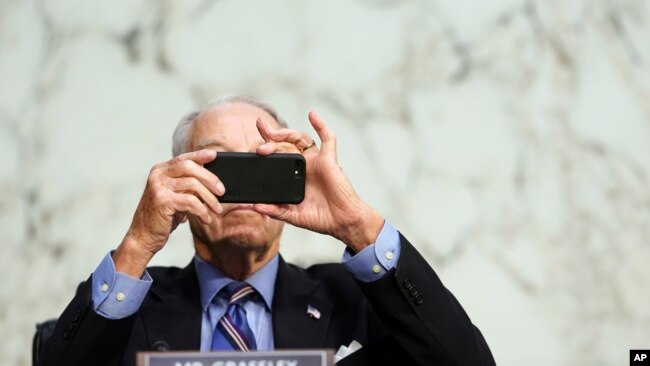ソーシャルメディアの偽情報の実態
すごいですね!何って、企業名が公開されています。
各企業で多くの人がPCを見つめ、削除をする作業を報道で以前見ました。
そこには、明確に決められた条件がありましたが、悩むことも多いようでした。
中には残酷な画像や性虐待映像もあり、検閲している人々は精神を病む事例もありました。きつい作業です。
政治的情報操作はいかに簡単になことか、驚きです。
自分が思っていることも、実は現状を確かに分かっているとは言えないし、その真実も実は多くの情報源から得られたフェイクです。
想いとは、意見とは、思いとは、一体何のでしょうか???
個々の正義は正でしょうか?
今日のVOA、英語を超える思考へ!!!
“That in turn deepens divisions and thus weakens us as a society,”
これは真実!!!
- すごいですね!何って、企業名が公開されています。
- 研究:ソーシャルメディアは簡単に操作される
- Study: Social Media Easily Manipulated
- Words in This Story
研究:ソーシャルメディアは簡単に操作される
Study: Social Media Easily Manipulated
ソーシャルメディア企業はソーシャルメディア操作を止める能力に差があることが新たな研究で明らかになりました。
NATO戦略コミュニケーション・センター・オブ・エクセレンスが研究を実施しました。アメリカの上院議員2人が参加しました。
ラトビアのリガに拠点を置く同センターの研究者は、偽のソーシャルメディア関与のためにロシアの企業3社にお金を支払いました。約368ドルで、研究者たちは、Facebook、Instagram、Twitter、YouTube、TikTokなどのソーシャルメディア上の投稿の偽の いいね!、閲覧、共有 を337,768件獲得しました。
それらの偽の いいね!、閲覧、および共有のいくつかは、チャック・グラスリー上院議員とクリス・マーフィー上院議員の検証済みアカウントに登場しました。検証済みアカウントとは、ソーシャルメディア企業が所有し、アカウントに名前が付けられた個人やグループによって管理されていることを確認したものです。
グラスリー氏のオフィスは、アイオワ州からの共和党員が研究に参加したことを確認しました。
コネチカット州の民主党員であるマーフィー氏は声明の中で、研究に参加することに同意したと述べました。同上院議員は、検証済みのアカウントであっても、操作されるリスクがあることを理解することが重要だと述べています。選挙運動を妨害したり、政情不安を煽ったりするツールとしてソーシャルメディアを利用することは簡単だ、とマーフィー氏は述べています。
「ソーシャルメディア企業が誤報や有料の操作に対抗するために十分なことをしていないことは明らかです...」と彼は述べています。
NATOストラトコムのジャニス・サーツ所長は、ソーシャルメディアの操作はビジネス市場を傷つけ、国家安全保障への脅威であるとAP通信に語っています。
サーツ氏は、どのような情報が人気があるかを決定するコンピュータープログラムを騙すために、偽のアカウントが採用されていると述べています。
「それはひいては分裂を深め、社会としての私たちを弱体化させます」と彼は説明します。
研究者によると、偽の関与の98%以上が、いいね!、閲覧、共有など、4週間後もアクティブな状態を維持していることがわかりました。そして、偽の活動のために報告されたアカウントの97%は、5日後もアクティブだったのです。
NATOストラトコムは、2019年にヨーロッパの高官のアカウントで同様のテストを行いました。彼らは、Twitterがより速く偽のコンテンツを取り締まるようになり、Facebookが偽のアカウントを作成しにくくなったことを見つけました。
「私たちは、最も被害をもたらす可能性のあるアカウントを止めることに重点を置いて、偽の関与に対する検出システムの強化に数年を費やしてきました。」とFacebook社の広報担当者は電子メールで述べています。
しかし、YouTubeとFacebookが所有するInstagramは依然としてリスクにさらされている、と研究者は述べ、TikTokは "無防備 "に見えますと言います。
研究者は、研究のために彼らは政治的ではなかったコンテンツを上げたと述べています。彼らは米国の選挙への干渉の可能性を避けたかったのです。
そのため、研究者たちは犬や食べ物の写真を掲載しました。
ベン・スコット氏は、民主主義に対するデジタルの脅威と戦うために活動しているグループ、Reset.techのエグゼクティブ・ディレクターです。スコット氏によると、今回の調査は、政治的なコミュニケーションを操作することがいかに容易であるかを示し、ソーシャルメディア企業が問題を解決するために行ってきたことがいかに少ないかを示したといいます。
Twitterのサイトインテグリティの責任者であるYoel Roth氏は、AP通信へのメールで、この問題は "進化する課題 "であると説明しています。
Roth氏は、今回の調査は、Twitterが公衆の会話の健全性を向上させるために行った大きな "努力 "を示していると付け加えています。
YouTubeは、サイト上の偽の活動を見つけるために安全対策を講じていると述べています。それは最近、200万本以上の動画がポリシーに違反したとしてサイトから削除されたことを指摘しました。
TikTokによると、偽の関与を支持するコンテンツやアカウント、その他の真実でない情報で被害をもたらす可能性のあるものを削除するといっています。
Study: Social Media Easily Manipulated
 FILE - In this Monday, Oct. 12, 2020 file photo, Sen. Chuck Grassley, R-Iowa, uses his smartphone during a hearing on Capitol Hill in Washington. (Erin Schaff/The New York Times via AP, Pool)
FILE - In this Monday, Oct. 12, 2020 file photo, Sen. Chuck Grassley, R-Iowa, uses his smartphone during a hearing on Capitol Hill in Washington. (Erin Schaff/The New York Times via AP, Pool)
New research shows that social media companies differ in their ability to stop social media manipulation.
The NATO Strategic Communications Center of Excellence carried out the study. Two American senators took part.
Researchers from the center, based in Riga, Latvia, paid three Russian companies for fake social media engagement. For around $368, researchers got 337,768 fake likes, views and shares of posts on social media, including Facebook, Instagram, Twitter, YouTube and TikTok.
Some of those fake likes, views, and shares appeared on the verified accounts of Senators Chuck Grassley and Chris Murphy. Verified accounts are those that social media companies have confirmed as owned and controlled by the individual or group named on the account.
Grassley’s office confirmed that the Republican from Iowa took part in the study.
Murphy, a Democrat from the state of Connecticut, said in a statement that he agreed to take part in the study. The senator said it is important to understand that even verified accounts are at risk of manipulation. It is easy to use social media as a tool to interfere with election campaigns and incite political unrest, Murphy said.
“It’s clear that social media companies are not doing enough to combat misinformation and paid manipulation…,” he said.
NATO StratCom director Janis Sarts told The Associated Press that social media manipulation hurts business markets and is a threat to national security.
Sarts said that fake accounts are being employed to trick computer programs that decide what information is popular.
“That in turn deepens divisions and thus weakens us as a society,” he explained.
More than 98 percent of the fake engagements - likes, views, shares - remained active after four weeks, researchers found. And 97 percent of the accounts they reported for fake activity were still active five days later.
NATO StratCom did a similar test in 2019 with the accounts of European officials. They found that Twitter is now taking down fake content faster and Facebook has made it harder to create fake accounts.
“We’ve spent years strengthening our detection systems against fake engagement with a focus on stopping the accounts that have the potential to cause the most harm,” a Facebook company spokesperson said in an email.
But YouTube and Facebook-owned Instagram remain open to risk, researchers said, and TikTok appeared “defenseless.”
Researchers said that for the study they pushed content that was not political. They wanted to avoid any possible interference in the U.S. election.
So, the researchers posted pictures of dogs and food.
Ben Scott is executive director of Reset.tech, a group that works to fight digital threats to democracy. Scott said the investigation showed how easy it is to manipulate political communication and how little social media companies have done to fix the problems.
In an email to the Associated Press, Yoel Roth, Twitter’s head of site integrity described the issue is an “evolving challenge.”
Roth added that the study shows the big “effort that Twitter has made to improve the health of the public conversation.”
YouTube said it has put in place safety measures to find fake activity on its site. It noted that more than 2 million videos were removed from the site recently for breaking its policies.
TikTok said it removes content or accounts that support fake engagement or other untrue information that may cause harm.
_____________________________________________________________
Words in This Story
fake – adj. not true or real
engagement – n. the act or state of being involved with something
content – n. the ideas, facts, or images that are in a book, article, speech, movie, etc.
detection -- n. the act or process of discovering, finding, or noticing something